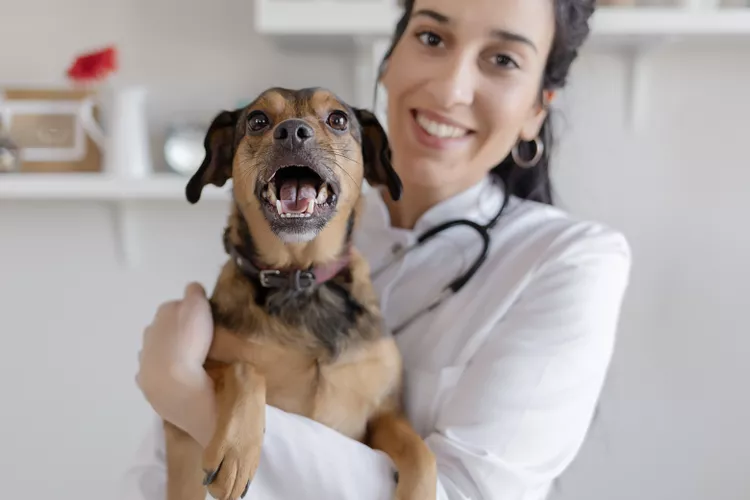
You have probably heard of kennel cough in dogs, but did you know that there is a vaccine for it? Vets commonly refer to this simply as the Bordetella vaccine and recommend it annually for the majority of dogs.
Kennel cough is a basic term used to describe canine infectious tracheobronchitis, an infectious respiratory disease that affects dogs. Kennel cough causes a hacking cough that can last for days to weeks. Most cases resolve with little to no treatment, but others can come severe and lead to pneumonia. Kennel cough is highly contagious and can quickly spread among dogs in close quarters, such as kennels and dog parks. Dogs contract kennel cough either by exposure to an infected dog or exposure to a contaminated surface or object.
There are many types of pathogens that can cause canine infectious tracheobronchitis. Most cases of kennel cough are caused by a combination of pathogens. Fortunately, there are vaccines available for the most common of these.
The DA2PP vaccine provides immunization against adenovirus type 2 and parainfluenza. A separate vaccine is available to immunize against Bordetella bronchiseptica. This vaccine is often referred to simply as "Bordetella" and may be abbreviated as "Bord" in your dog's records.
The Bordetella vaccine is available in three forms categorized by the route of administration.
Most veterinarians recommend the intranasal or intraoral forms over the injectable version because they offer better protection against Bordetella. Many vets reserve the injectable vaccine only for dogs with aggression or extreme aversion to having their faces touched. There is some debate about the intranasal efficacy compared with the intraoral. Some vets prefer the intranasal form because of the additional protection against other agents that can cause kennel cough. Evidence suggests that, while both the intranasal and intraoral vaccines are effective, the intranasal may offer better protection.
Dogs immunized with the Bordetella vaccine can still get kennel cough because of the variety of pathogens that cause the disease. However, vaccination reduces the severity of kennel cough and helps prevents its spread.
Bordetella is considered a non-core vaccine by the American Animal Hospital Association, meaning it may be recommended depending on the dog's lifestyle.
In general, any dog that spends a lot of time around other dogs should get the Bordetella vaccine. This vaccine is required by most boarding facilities, groomers, dog show rings, dog training facilities, and doggy daycare centers to prevent outbreaks.
There is a significantly reduced likelihood of kennel cough exposure in dogs that do not come into contact with dogs outside the household. While these dogs can still get kennel cough through accidental exposure, they are unlikely to spread it due to their lifestyles.
Your veterinarian will discuss your dog's lifestyle with you and help you make an informed decision about your dog's vaccinations.
The Bordetella vaccine is typically part of the puppy vaccination schedule for puppies. It is recommended for most puppies so they will have protection when they start going to puppy classes, dog parks, and other places for socialization.
Most veterinarians recommend the first intranasal or intraoral Bordetella vaccine between eight and 14 weeks of age. The initial vaccine may need to be repeated within two to four weeks for full immunization, depending on the age of the puppy at the time of vaccination and the type of vaccine used.
After the initial puppy vaccines, a Bordetella booster should be given annually, though it may be used up to every 6 months in certain high-risk scenarios..
Every vaccine has potential side effects, but veterinarians agree that the benefits of vaccines outweigh the risks in most cases. Vaccines typically have self-limiting effects. They can cause lethargy, poor appetite, and minor pain and/or swelling at the site of injection. These effects tend to resolve within one or two days.
Vaccines should not be given to a dog with a fever. In general, a sick dog should not be vaccinated until fully recovered from illness. Vaccines are typically avoided in any dog with a history of immune-mediated disease because they may cause the dog to become sick.
Vaccine reactions are uncommon and generally occur within 15-30 minutes of injection. Signs include vomiting, diarrhea, seizures, trouble breathing, facial swelling, and collapse. Bring your dog back to the vet immediately if you notice any of these signs.
Little evidence exists for potential long-term side effects of the kennel cough vaccine for dogs. In general, overvaccination has been associated with an increased risk of autoimmune disease in dogs. However, current vaccine protocols are developed with a goal to reduce overvaccination. Most dogs experience no long-term effects from immunizations.

212 Hairless Cat Names For Your Beautifully Bald Feline
Discover the perfect name for your hairless cat with our list of over 200 creative and unique names. From quirky to classic, find a fitting choice for your beautifully bald feline companion.
8 Things Your Cat Loves
Just like humans, cats can have a long list of things they like. Find out what cats love so you can keep your cat happy and healthy.
How to Tell If a Kitten is a Boy or a Girl
If you're wondering whether your new kitten is a boy or a girl, here are three ways to help determine the sex of your cat.
8 Tips to Help Cats Enjoy Car Travel
Cats are creatures of habit, and they hate to travel. Learn tips to prepare them for travel in the car, whether going to the vet or on vacation.
Common Causes of Mucus in Dog Poop
Seeing mucus in your dog's poop can be concerning to a dog owner. Here are common causes and treatment of mucus in a dog's stool.
Is Shrimp Bad For Dogs?
Shrimp can be a healthy, nutritional food for people but can dogs eat them, too? What are the main concerns with feeding shrimp to your dog?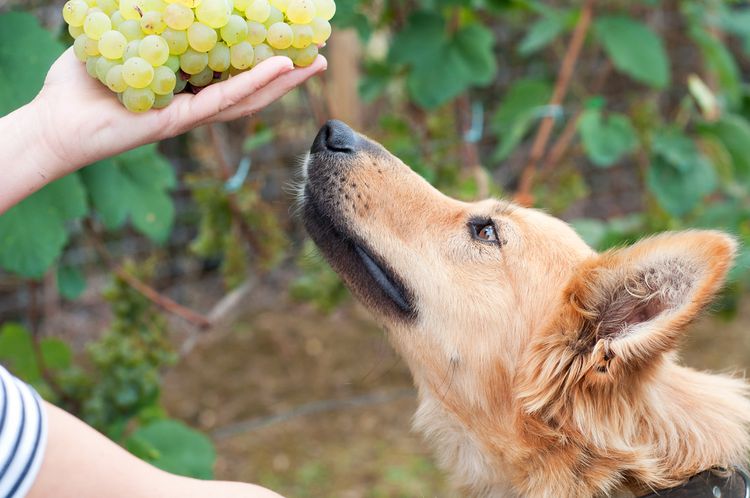
Can Dogs Eat Grapes?
Are grapes safe for dogs? Grapes and raisins can cause serious toxicity in dogs. Find out what to do if your dog eats grapes.
Maine Coon Cat: Breed Profile, Characteristics & Care
The Maine Coon cat is of the largest cat breeds in the world. These amiable, gentle cats make great companions. Learn about the Maine Coon cat breed's appearance, temperament, health, and care needs.
Selkirk Rex: Cat Breed Profile, Characteristics & Care
The Selkirk Rex is a charming cat with a tousled coat and a loving, laid-back personality. Learn about the Selkirk Rex breed.
How to Stop Your Cat From Chewing Electrical Cords
Cats are known to pounce and attack inanimate objects, like electrical cords. Learn how to prevent your cat from ambushing objects that may harm it.
What Do Cats Think About?
Have you ever wondered what cats think about? A number of studies have explored cat behavior and feline cognition, but there's still more to learn.
Training Your Kitten to Use the Litter Box
Bringing home a new kitten means they need to learn how to properly use a litter box. Discover how to successfully litter box train your kitten.
Why Do Cats Knead?
Kneading is a common behavior in cats of all ages. Learn why cats "make biscuits" and what it means for you, your cat, and all your blankets.
Dandie Dinmont Terrier: Dog Breed Characteristics & Care
Learn about the Dandie Dinmont Terrier, a silky dog breed with a signature puff of hair atop its head and a friendly, companionable personality.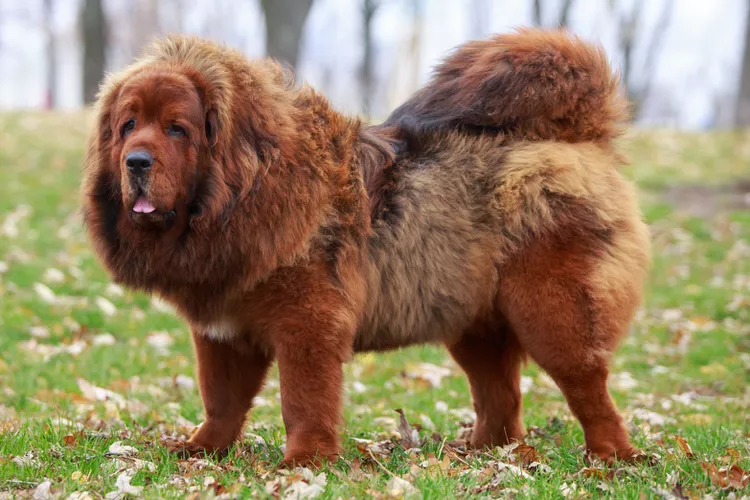
Tibetan Mastiff: Dog Breed Characteristics & Care
Learn about the Tibetan mastiff, an ancient guardian dog breed. This breed is known for their massive stature, flowing mane, and protective personality.
4 Reasons Why Your Dog Licks Their Butt
Butt-licking in dogs can be a part of normal grooming, but excessive butt-licking is not normal. Read about the most common reasons for this behavior.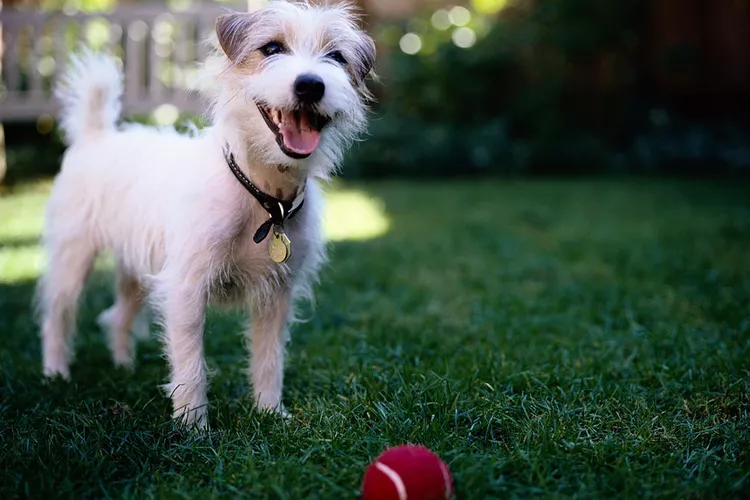
How to Teach Your Dog the "Leave It" Command
Training your dog the "leave it" command is a great way to instill self-control. Learn how to teach your dog to not pick things up from the ground.
How to Solve Your Dog's Fear of Car Rides
Is your dog scared of car rides? This fear of riding in cars is common. Learn why your dog is scared of car rides and how to help conquer this fear.
Can Dogs Get Depression? How to Help Your Sad Dog
Can dogs get depression? Learn about the signs of depression in dogs and find out how to help your sad dog.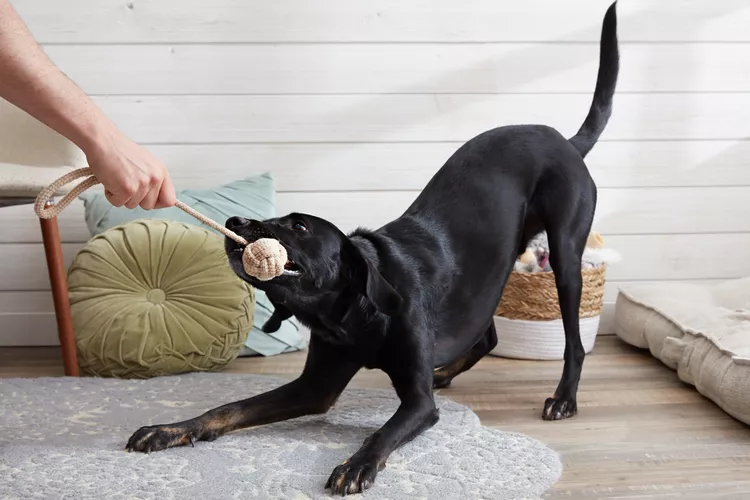
How to Play Tug of War With Your Dog
Many dogs love to play tug of war, and it's a healthy game that provides great exercise. Learn the best way to safely play tug of war with your dog.